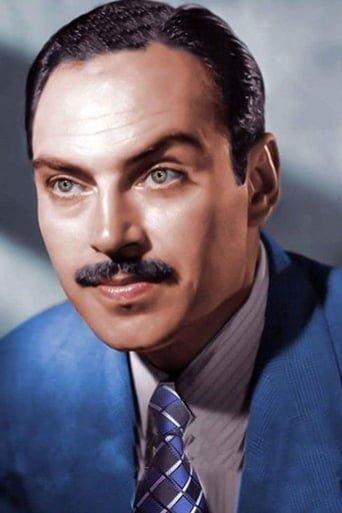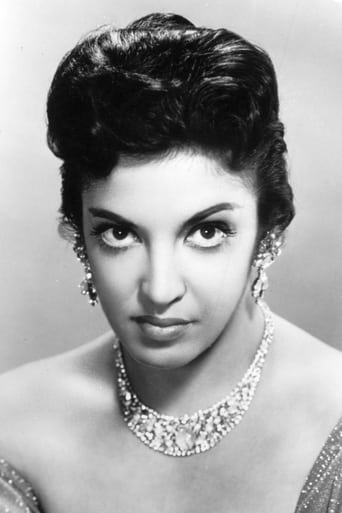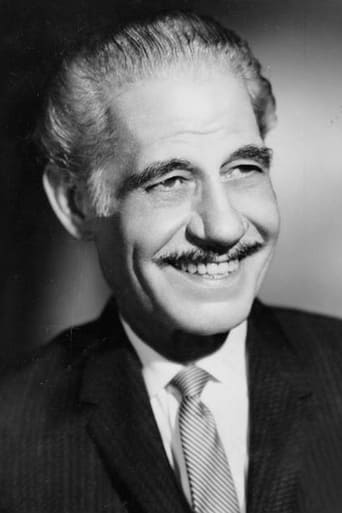ma-cortes
In El Bruto, a violent, ox-like abattoir worker (the great Pedro Armendáriz) is hired by a wealthy and evil old man to do a slum landlord's dirty work . There he proceeds to destroy everyone around him . But the tough, tall and strong Bruto called Pedro will fall in love for a girl called Merche (Rosa Arenas) who lives with her father in the building about to be demolish . Meanwhile , Pedro will work in a butcher's shop , where is also Paloma (Katy Jurado) , Andres (Andres Soler)'s spouse, a mature woman who starts to feel attracted to El Bruto .Buñuel explores his characteristic themes of lust , jealousy , cruelty, class differences , hypocrisy and corruption . This isn't a typical Buñuel film , though there are some symbolism but no surrealism . Interesting and thought-provoking screenplay by the same Luis Buñuel and his usual Mexican collaborator Luis Alcoriza , being efficiently produced by Oscar Danzigers . After his first French period working in which he directed his two greatest surrealist films , he disappeared below the radar in Mexico on a variety of ultra-low-budget films, few of which made much impact outside Spanish-speaking countries , though many of them are well worth watching ; one of them is this ¨Le Brute¨ or ¨El Bruto¨ . Buñuel was given a strict Jesuit education which sowed the seeds of his obsession with both subversive behavior and gritty human dramas , issues well shown in this picture . Pretty good cast gives fine acting ; it is formed by nice Mexican actors such as Pedro Armendariz as El Bruto , a bouncing to kick out a poor people from their houses , Katy Jurado as a satanic Femme Fatale and the innocent and virginal Rosa Arenas .The motion picture was stunningly directed by Luis Buñuel who was voted the 14th Greatest Director of all time . This Buñuel's strange film belongs to his Mexican second period ; in fact , it's plenty of known Mexican actors . As Buñuel subsequently emigrated from Mexico to France where filmed other excellent movies . After moving to Paris , at the beginning Buñuel did a variety of film-related odd jobs , including working as an assistant to director Jean Epstein . With financial help from his mother and creative assistance from Dalí, he made his first film , this 17-minute "Un Chien Andalou" (1929), and immediately catapulted himself into film history thanks to its disturbing images and surrealist plot . The following year , sponsored by wealthy art patrons, he made his first picture , the scabrous witty and violent "Age of Gold" (1930), which mercilessly attacked the church and the middle classes, themes that would preoccupy Buñuel for the rest of his career . After his two avant-garde collaborations with fellow surrealist Salvador Dali , his career, though, seemed almost over by the mid-1930s, as he found work increasingly hard to come by and after the Spanish Civil War , where he made ¨Las Hurdes¨ , as Luis emigrated to the US where he worked for the Museum of Modern Art and as a film dubber for Warner Bros . He subsequently went on his Mexican period he teamed up with producer Óscar Dancigers and after a couple of unmemorable efforts shot back to international attention , reappearing at Cannes with ¨Los Olvidados¨ in 1951 , a lacerating study of Mexican street urchins , winning him the Best Director award at the Cannes Film Festival. But despite this new-found acclaim, Buñuel spent much of the next decade working on a variety of ultra-low-budget films, few of which made much impact outside Spanish-speaking countries , though many of them are well worth seeking out . As he went on filming "The Great Madcap" , ¨The brute¨, "Wuthering Heights", ¨El¨ , ¨Susana¨ , "The Criminal Life of Archibaldo De la Cruz" , ¨Robinson Crusoe¨ , ¨Death in the garden¨ and many others . His mostly little-known Mexican films , rough-hewn , low-budget melodramas for the most part , are always thought-provoking and interesting ; being ordinary screenwriter Julio Alejandro and Luis Alcoriza . He continued working there until re-establishing himself in Europe in the 1960s as one of the great directors . And finally his French-Spanish period in collaboration with producer Serge Silberman and writer Jean-Claude Carrière with notorious as well as polemic films such as ¨Viridiana¨ was prohibited on the grounds of blasphemy , ¨Tristana¨ , ¨The Discreet Charm of the Bourgeoisie" , of course , ¨ ¨Belle Du Jour¨ , with all the kinky French sex and his last picture , "That Obscure Object of Desire" .
Michael_Elliott
Bruto, El (1952) *** (out of 4) A slumlord (Andres Soler) tries to evict some tenants from one of his rundown apartments but they refuse to go so he asks a strong but dumb Bruto (Pedro Armenariz) to scare them. Bruto goes to the man causing the most trouble not knowing that he is ill. After a strong punch the man dies and soon Bruto falls in love with a woman (Rosa Arenas) not realizing that it's the dead man's daughter. I was a little worried going into this film after reading some negative reviews but it turned out to be pretty good and didn't just focus or preach about how the poor are treated. As the film started I was thinking this was just going to be a morality tale but Bunuel takes the film into many different directions and really delivers a terrific character study for not only Bruto but the slumlord as well. I really enjoyed the way that Bunuel didn't just show both men as evil but showed that they both had good qualities below all the bad things that they do. The relationship with Paloma (Katy Jurado), the slumlord's much younger wife, gives us plenty of insight to the two men and especially with Bruto and his dumbness. I also loved the style that Bunuel brought to the film in terms of shadows, which is perfectly used during one scene where a group of men are chasing Bruto to kill him. What really keeps this film going are the terrific performances by the entire cast. Armenariz does a brilliant job at being the brute but his performance is made even better by the fact that he can pull off the character's weaker moments. Arenas is downright beautiful and very touching in her role and I really couldn't take my eyes off of Soler who really steals the film with his snake like qualities. This here certainly doesn't rank among the director's greatest works but I think it's still a very entertaining film with a lot going for it.
dbdumonteil
"El Bruto" might be Andrés' s son and like in Frankenstein.....When a director is as strong as Bunuel (whose filmography is huge and brilliant),some of his works may seem lacklustre by association. But further acquaintance shows this: all -except the obsession with religion- the Master's permanent features are here: the old man who eats candies is akin to the grandpa who rapes his granddaughter in "Cela S'Appelle l'Aurore " ;the young girl with the madonna face ,Meche,and the bitch ,the sensual beautiful Paloma (Katy Jurado:you should see her cut her flowers )we've already met them( In " Los OLvidados",Pedro's bitchy mother became a madonna in his dreams) and we would meet them again all along Bunuel's canon(in "La Mort En CE Jardin" :Michèle Girardon and Simone Signoret);in "Cet Obscur Objet du Desir" they would become one.The bourgeoisie's selfishness is also present.Perhaps not among Bunuel's essential,but none of his fans would like to miss it.
MartinHafer
I was very surprised when I watched this movie how "normal" it seemed compared to all the other Luis Buñuel directed movies I have seen. In fact, it seems pretty normal compared to most any other film. While the plot is a bit unusual, none of the typical Buñuel touches are present--it's just a straight-forward story of a dim-witted man who is manipulated by an evil old man--and eventually, this manipulation has some very unintended consequences. No, there isn't a touch of Surrealism or Absurdism in the plot--just a pretty well-made Mexican movie starring Pedro Armendarez. So, if you are NOT disappointed by the normalness of the film, it is still a pretty good film--not particularly memorable, but still good. The acting and writing are all just fine.





